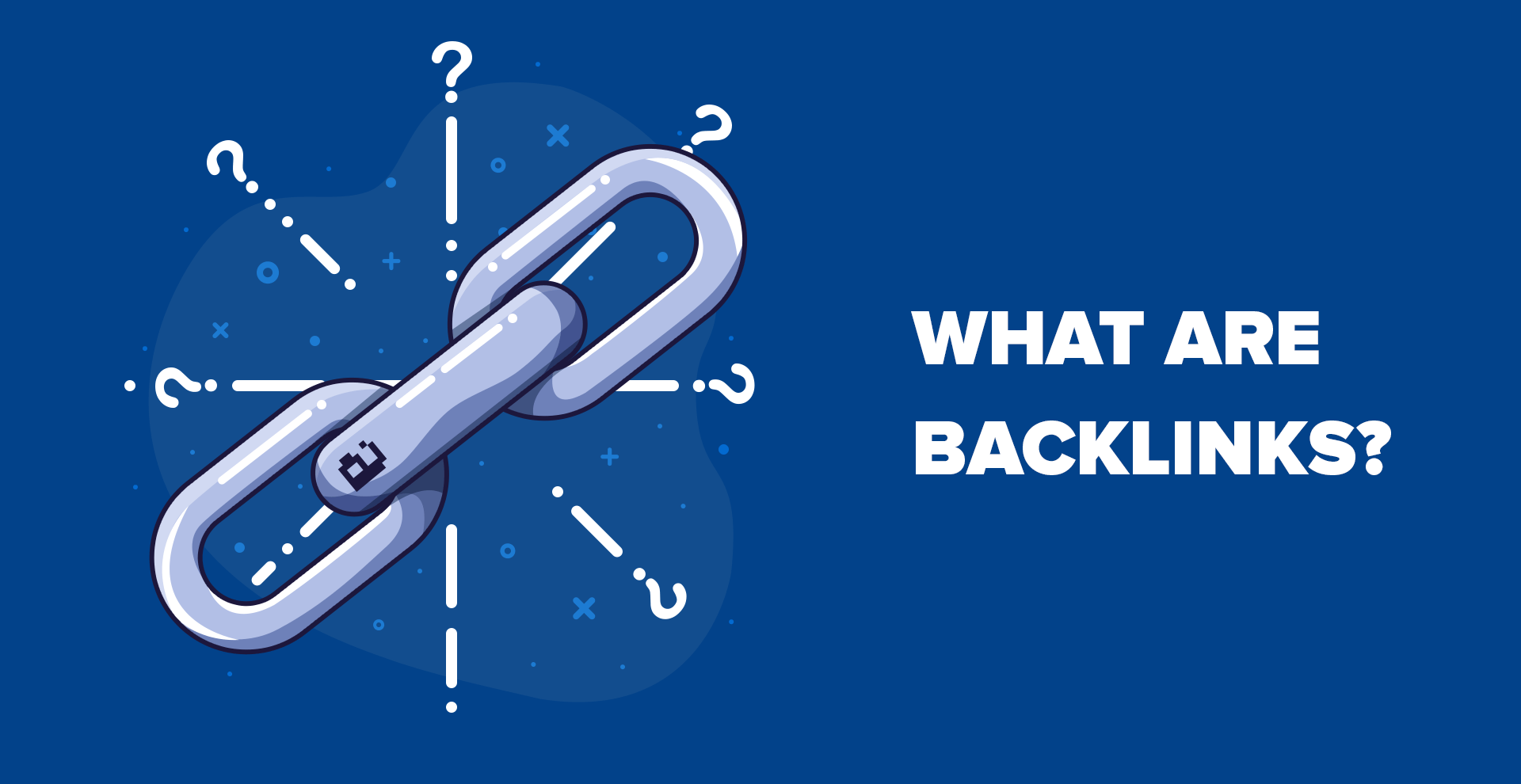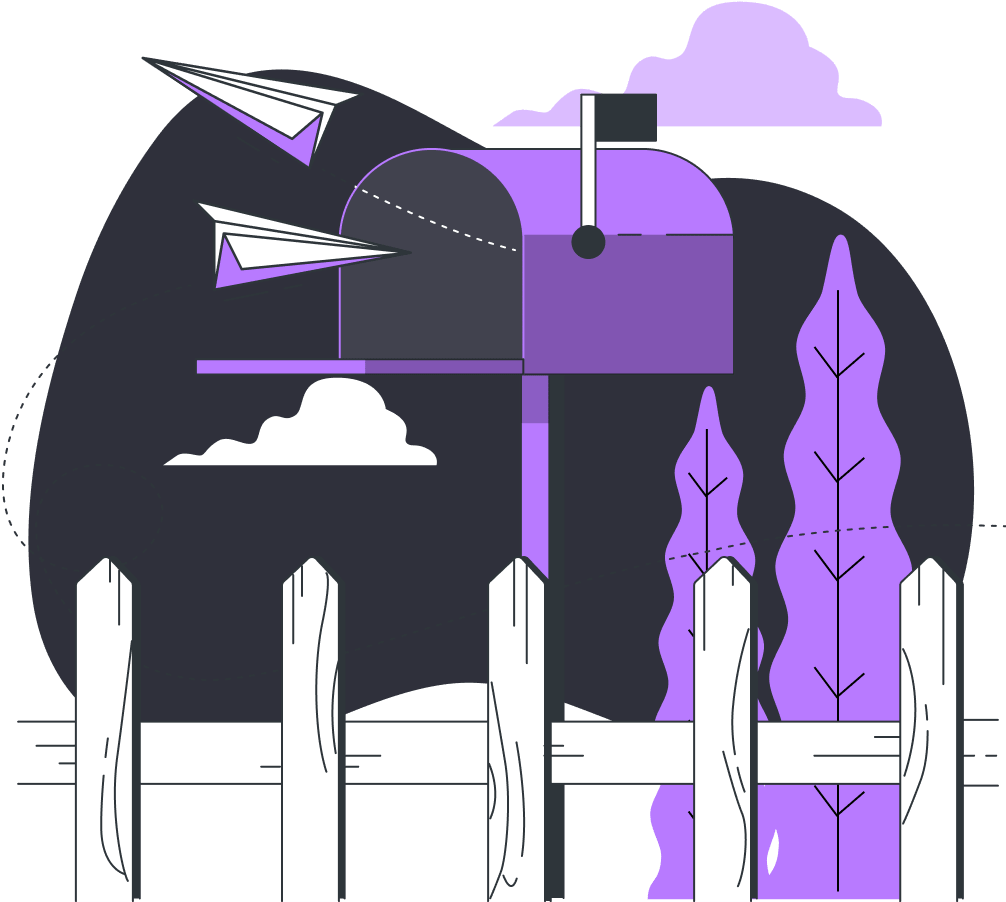Backlinks are links from a page on one website to another. If someone links to your site, then you have a backlink from them. If you link to another website, then they have a backlink from you.
For example, these words link to YouTube, so they now have a backlink from us.
In this guide, you’ll learn:
Sidenote.
If one page links to another on the same website, that’s known as an internal backlink.
https://www.youtube.com/watch?v=O5L9mBceJ7s
Why are backlinks important?
Backlinks help with three main things.
1. Rankings
Search engines like Google see backlinks as votes of confidence. Generally speaking, the more votes your web pages have, the more likely they are to rank for relevant search queries.
How do we know? We’ve studied link-based ranking factors on a few occasions and always find the same thing: the number of backlinks from unique websites (referring domains) correlates strongly with organic search traffic.
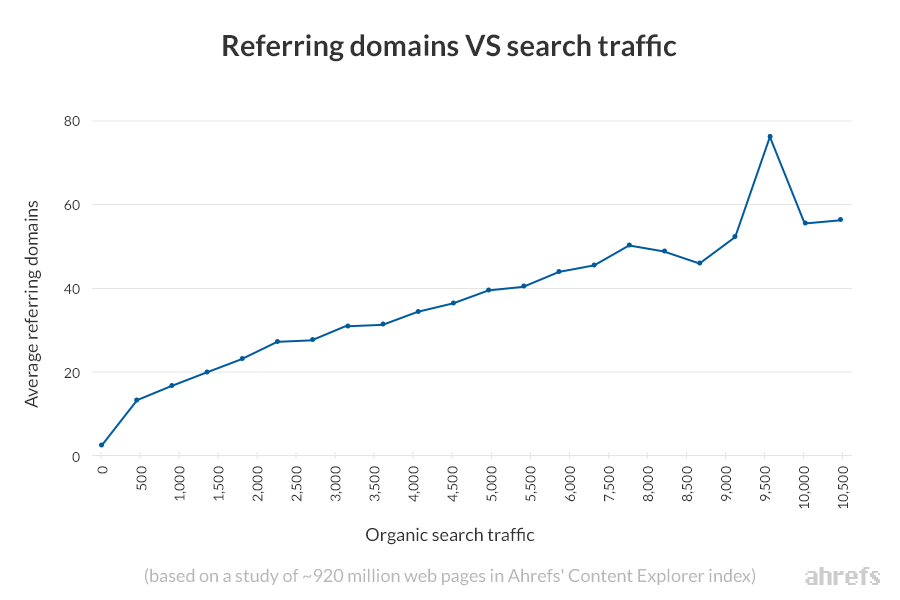
2. Discoverability
Search engines find new content by revisiting pages they already know about to check for new links.
Because search engines revisit popular pages more often than unpopular ones, they may discover your content faster if you get backlinks from popular pages.
3. Referral traffic
Backlinks exist to point people to useful resources. That’s why they’re clickable.
When someone clicks on a link to your website, you get referral traffic.
What makes a good backlink?
Not all backlinks are created equal. Here are some of the many attributes that contribute to a backlink’s quality and utility.
https://www.youtube.com/watch?v=E3mDlVutW_o
Relevance
Google places more value on relevant backlinks because people are more likely to click on them. This is something they talk about in their “reasonable surfer” patent.
What does this mean in real terms? If a plumber has backlinks from two pages, one about cats and one about installing boilers, chances are the latter is most valuable.
This idea also plays out at the domain level.
Readers of plumbing.com are more likely to click on a link to a plumber’s website than readers of cats.com.
Authority
Backlinks from strong web pages usually transfer more “authority” than those from weak ones.
Page-level authority is something we’ve studied a few times, and we’ve found a clear relationship between it and organic traffic.
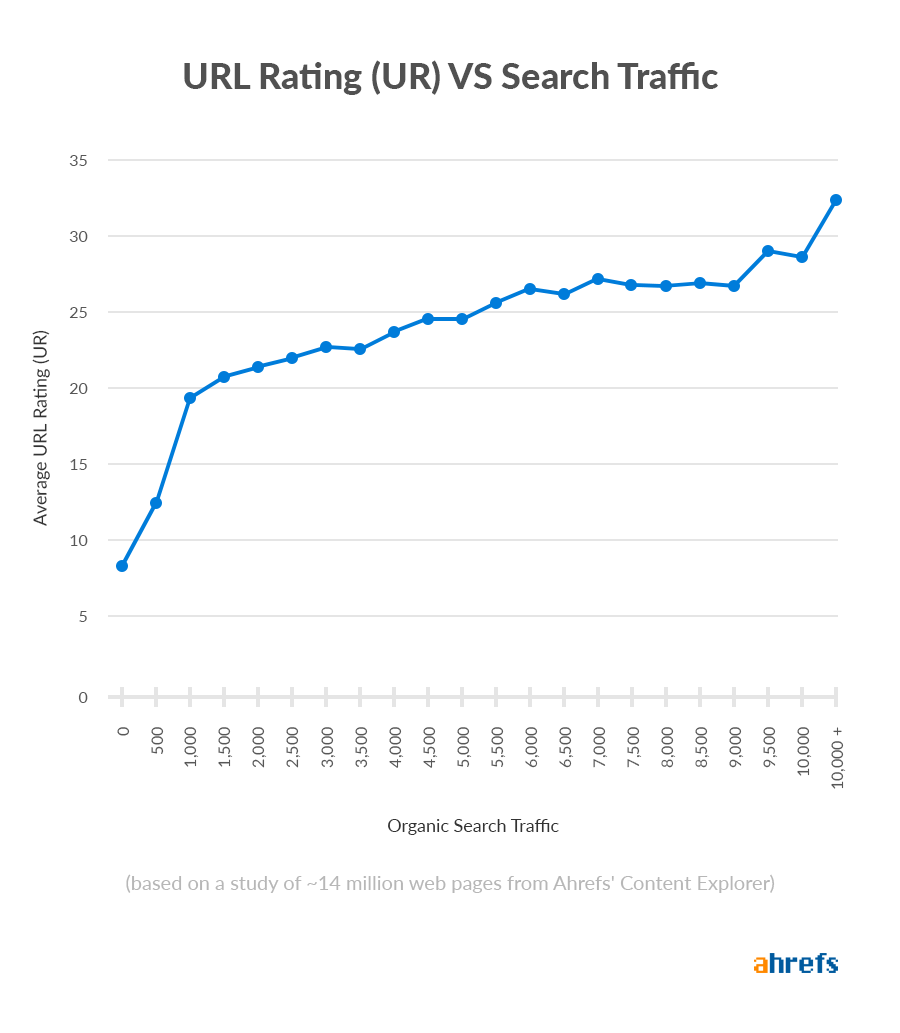
Sidenote.
URL Rating (UR) is Ahrefs’ page-level authority metric. It’s scored on a scale from 0-100.
That said, backlinks from strong pages don’t always transfer more authority.
Google’s original patent states that authority is split equally between all outbound links on a web page. So if you have backlinks from two pages and one has more outbound links than the other, then, all else being equal, the link from the page with fewer outbound links transfers more authority.
Are things that simple these days? Probably not. Google has a fair number of patents describing various methods for assigning value to backlinks.
Furthermore, internal backlinks also contribute to a page’s authority.
Traffic
Backlinks from high-traffic pages will usually send you more referral traffic than those from low-traffic pages. That’s obvious. The real question is whether backlinks from high-traffic pages positively affect rankings more than those from low-traffic pages?
This is a question we recently tried to answer. We took the top-ranking pages for 44,589 non-branded keywords and looked at organic traffic to the pages that link to them.
Here’s what we found:
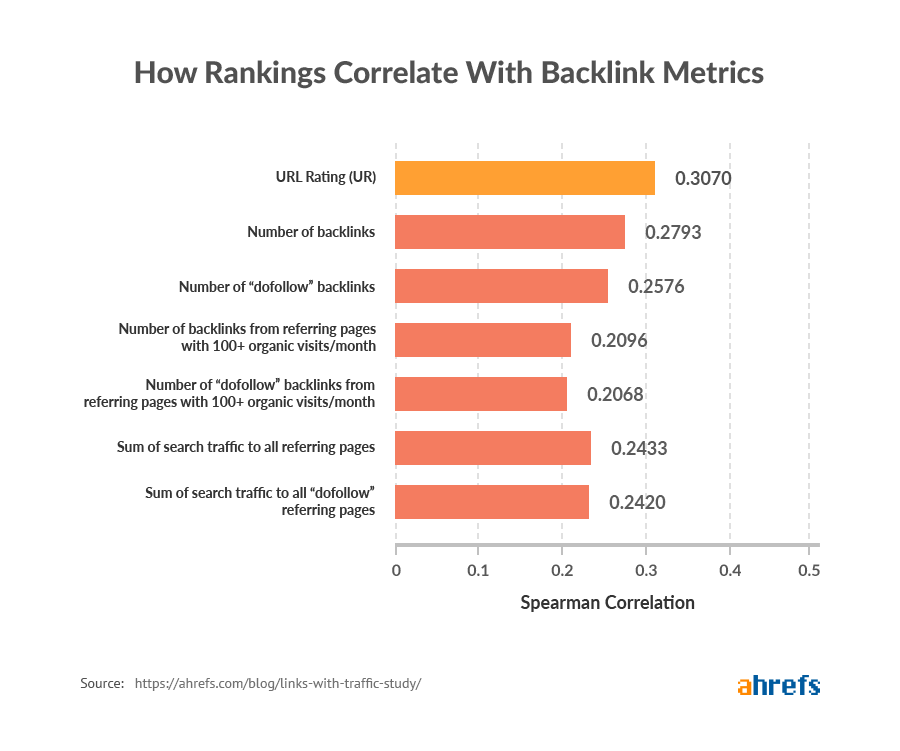
Long story short, there’s a small but clear correlation between rankings and backlinks from pages with organic search traffic. However, the sheer number of backlinks from unique websites (referring domains) and page-level authority look to be more important.
Placement
Because people are more likely to click prominently-placed links, some links on web pages likely pass more authority than others.
Bill Slawski talks about this in his analysis of Google’s updated “reasonable surfer” patent.
If a link is in the main content area of a page, uses a font and color that might make it stand out, and uses text that may make it something likely that someone might click upon it, then it could pass along a fair amount of PageRank. On the other hand, if it combines features that make it less likely to be clicked upon, such as being in the footer of a page, in the same color text as the rest of the text on that page, and the same font type, and uses anchor text that doesn’t interest people, it may not pass along a lot of PageRank.
Consider this when pursuing links. If your link will likely end up in the site’s footer, or along with fifty other sites in the sidebar, then put your energy into other opportunities.
Followed vs. nofollowed
Nofollowed backlinks don’t usually influence the linked page’s rankings—although they can.
Because link building takes time and effort, it’s best to prioritize getting followed links. Just don’t kick up a fuss if you get a nofollowed link. It may still have some SEO value.
Recommended reading: What Is a Nofollow Link? Everything You Need to Know
Anchor text
Anchor text refers to the clickable words that form a backlink.
Google says that anchor text influences rankings in their original patent.
Google employs a number of techniques to improve search quality including page rank, anchor text, and proximity information.
That said, when we studied the relationship between anchor text and rankings across 384,614 pages, the correlations were weak.
So while anchor text does matter, it’s not as important as other things.
Sidenote.
If you’re building backlinks through outreach, you won’t usually have much control over the anchor text used when linking to your site. That’s a good thing. It helps keep things natural and is also a sign that the link you’ve acquired is of a certain quality.
How to check backlinks
There are two ways to check a website or web page’s backlinks. The first method only works for sites that you own. Use the second to check backlinks to another website or web page.
Checking backlinks in Google Search Console
Google Search Console gives you data about your website’s organic search traffic and overall performance. It’s free to use—just sign up for a free account and verify ownership of your website.
Once signed in, click “Links” on the sidebar.
The number below “External links” shows the total number of unique backlinks to the website.
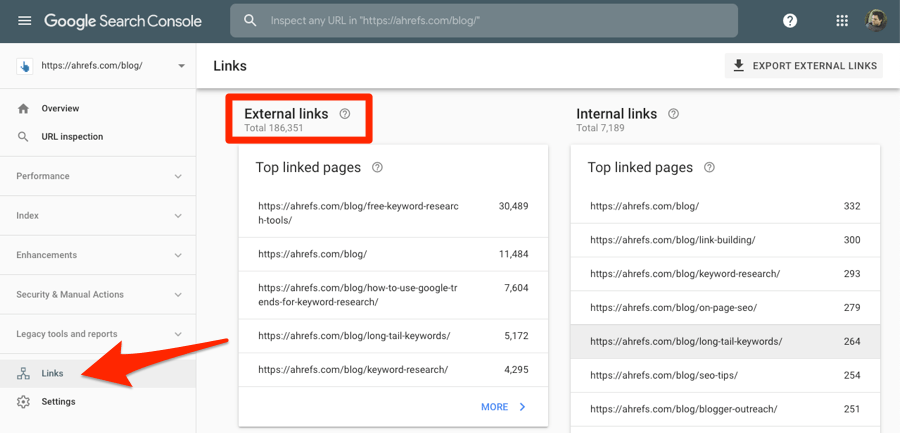
Below this are three reports.
- Top linked pages: The most linked pages on your website.
- Top linking sites: The sites with the most backlinks to your website.
- Top linking text: The most frequently used anchors when linking to your website.
If you’re new to Search Console, start with the Top linked pages report.
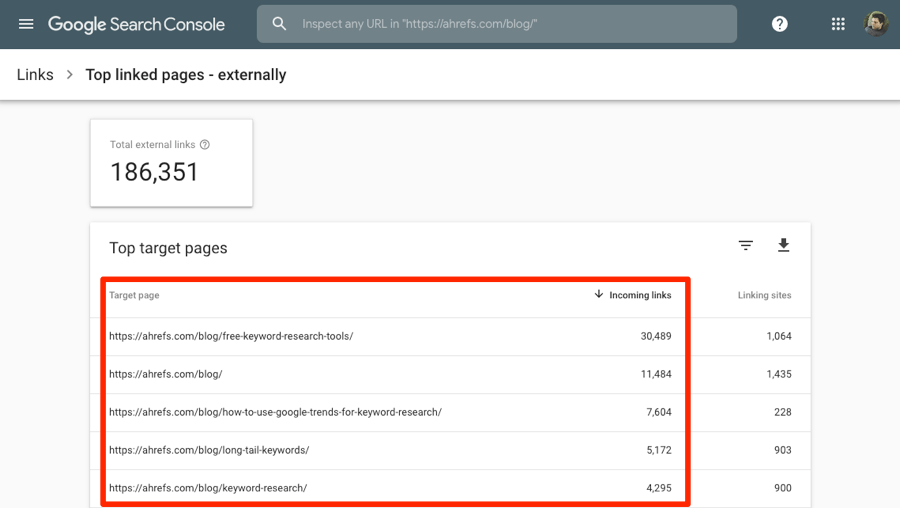
Then click on any URL to see the websites linking to a specific page.
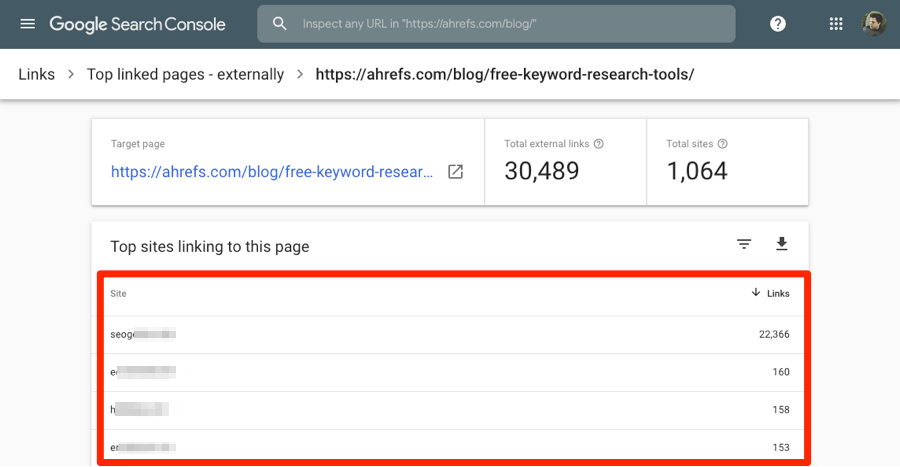
Then click on any website to see which of its pages link to that page.
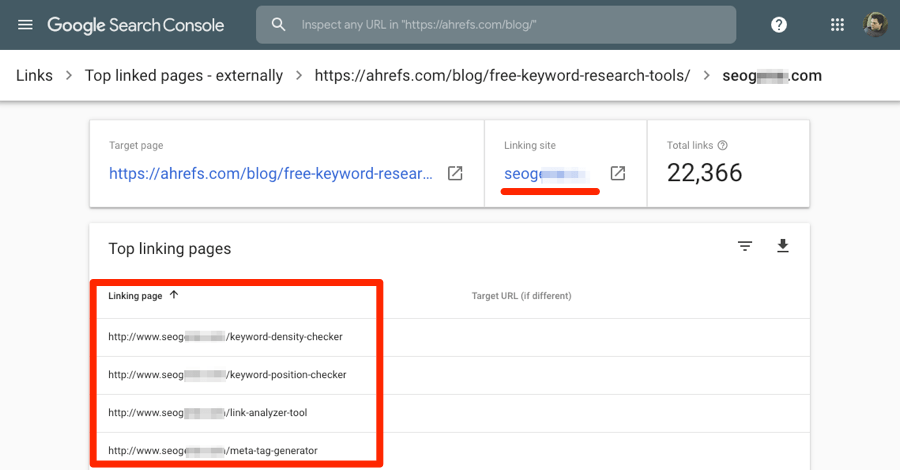
Checking backlinks using a third-party backlink checker
To check backlinks to a website that you don’t own, use a tool like Ahrefs’ free backlink checker.
Just enter a domain or URL, and hit “Check backlinks.”
You’ll see the total number of backlinks and referring domains (links from unique websites), plus the top 100 backlinks.
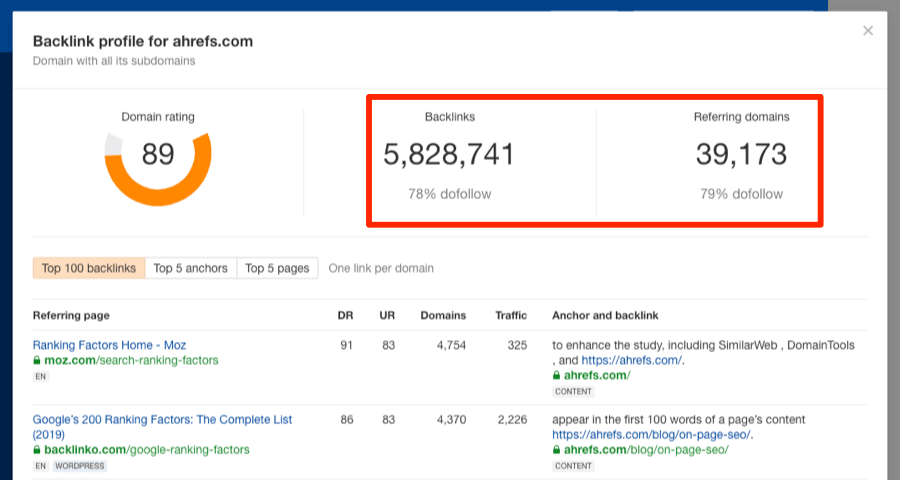
For each backlink, you’ll see a few details, including:
- Referring page: The page linking to the target.
- Domain Rating (DR): The strength of the linking website.
- URL Rating (UR): The strength of the linking web page.
- Traffic: The total estimated monthly organic search traffic to the linking page.
- Anchor and backlink. The anchor and surrounding link text.
Sidenote.
Our free backlink checker shows only one backlink per domain.
To see the five most frequently used anchors, check the “Top 5 anchors” report.
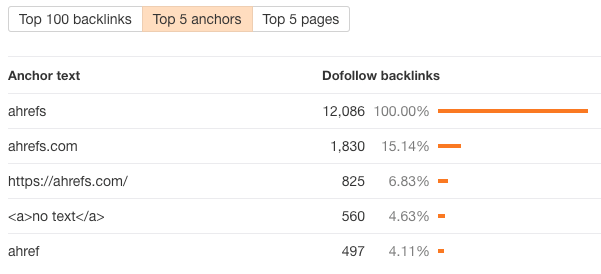
To see the five most linked pages, check the “Top 5 pages” report.
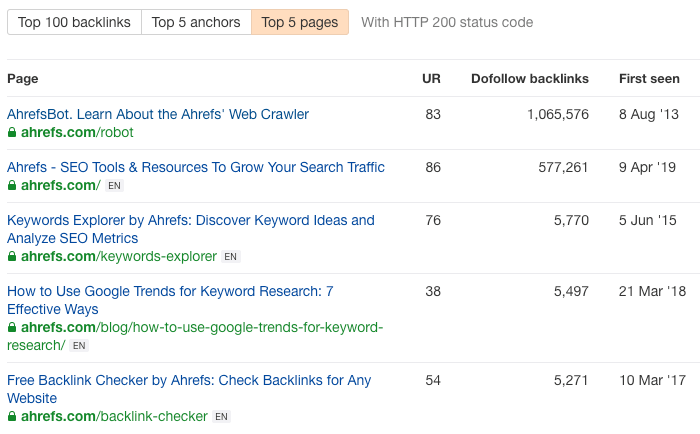
Sidenote.
The Top 5 pages report only works if you’re analyzing a domain, not a web page.
To see a full list of backlinks for any page or website, use Ahrefs Site Explorer.
How to get more backlinks
There are three ways to get more backlinks: create them, earn them, or build them.
Earning backlinks
This is when people discover your content via search engines like Google, social media, or word of mouth, and choose to link to your page. In order words, earned backlinks are organic.
You can improve your chances of earning more backlinks by creating truly useful content that people should want to link to.
Creating backlinks
This is when you manually add links to your site from other websites. Examples include submitting to business directories, leaving blog comments, and replying to forum threads.
Building backlinks
This is when you reach out to other site owners, editors, or webmasters and ask them to link to your page. For this to work, you need to have a clear value proposition. That’s where link building tactics come in.
Here are a few tried and tested ones:
- Guest blogging: Offer to write a one-off post for another website.
- Broken link building: Find relevant dead links on other sites, then reach out and suggest your working link as the replacement. (You can use our broken link checker to do this.)
- The Skyscraper Technique: Find relevant content with lots of links, make something better, then ask those linking to the original to link to you instead.
- Unlinked mentions: Find unlinked mentions of your brand, then ask the author to make the mention clickable.
Learn more about these tactics and others in the video and posts below.
https://www.youtube.com/watch?v=C5ddo63kHHI
Final thoughts
Backlinks are important when it comes to ranking in search engines like Google. That said, not all backlinks are created equal. Relevance, placement, and other attributes all contribute to a link’s quality and utility.
As a general rule of thumb, the easier it is to get a link, the less valuable it’ll be.
Looking to get started with link building? Read our noob-friendly guide or watch this:
https://www.youtube.com/watch?v=bwYZGWDlQd8
Got questions? Leave a comment or ping me on Twitter.


